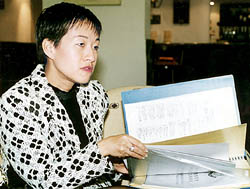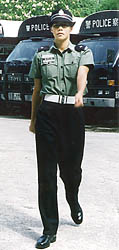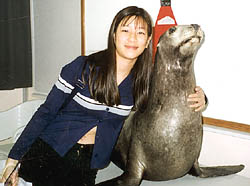



















| |
 WCIP Lo: "The 36-week residential induction course is extremely innovative and comprehensive" |
WITH a second to none induction course for
newly recruited probationary inspectors, the Police Training School came to among 33
government departments participating in the first HKSAR Civil Service Human Resource
Management Competition organised by the Civil Service Training and Development Institute
(CSTDI) earlier this year.
"The 36-week residential induction course is extremely innovative and comprehensive. Probationary inspectors learn about the laws of Hong Kong and partake in intensive physical fitness as well as leadership training," said PTS Course Instructor WCIP Vivian Lo. "In addition to routine courses, we invite professionals to give talks to our students on subjects such as forensic science and to explain how their expertise can be applied to police duties." |
|
Ms Lo pointed out that the diversity in scope of police officers' work makes it necessary for them to keep abreast and in tune with what is going on in society. To this end probationary inspectors are encouraged to get involved work that brings them into contact with such diverse groups as the elderly, children and the handicapped. Probationary inspectors are also tested at various stages of training to ensure their physical fitness meets the Force's requirements. During a 10-day management course jointly organised by PTS and the Outward Bound School, probationary inspectors learn how to survive when stranded on a remote island with little provisions. "The induction course is not a static one and we are constantly reviewing its structure to meet the needs of changing circumstances," said Ms Lo. "Nor do we want to make the course unidirectional. We encourage active involvement and feedback from all of our students, who invariable become good friends with one another over the 36-week course. This not only enriches their social life, but also forms a valuable network that benefits them when they go out to work." The close-knit nature and length of the induction course also fosters a sense of respect and trust between students and instructors who are also always willing to offer advice to their present and former students after they pass-out and assume their duties as police officers. Reflecting on her years as a PTS instructor. Ms Lo said she was most pleased to see those probationary inspectors who were initially not very promising but who passed-out with flying colours as a result of their own hard work and the guidance offered by their instructors. "The unhappy moments are when probationary inspectors with great potential drop out of the course because of a lack of stamina," she added. "However, the situation is quite satisfactory taking into account the 80 to 90 per cent course graduation rate." | |
| |
|
IT was another "school day" for Winsy Ng
Wing-see, a probationary inspectors who joined PTS in mid-August this year after
graduating from the University of Southern California in Los Angeles with a major in
business administration.
"I was braced for the pressure at PTS when I decided to join the Force. As it turned out Ал the pressure was much more than I'd expected, "said the 23-year-old PI. "I couldn't have made it without the guidance and support from my Course Instructor (CI)," she said. According to Ms Ng, her CI was more than a teacher in subjects relating to police work. She was also her mentor. "Having been together for nearly nine months, my CI has gotten to know me better than my parents, "she said. "Having gone part way through the PI induction course, I realise that a real leader must be more than a hard worker. He or she must lead by example and make others follow as a group, "added the young woman police officer. |
 Probationary inspector Winsy Ng Wing-see: "The induction course is teaching me as much about life skills as police skills" |
|
"In addition, a police officer needs to broaden his or her perspective and foresight in order to know how to adopt the best approach to changing circumstances. Indeed, the induction course is teaching me as much about life skills as police skills. I now understand what discipline is Ал and that what I do very often affects other people. Consequently I've become much more considerate, which surprised my parents when I was home for holidays." On the social front, she said: "Some think life in PTS is all study and training. But we have an unbelievably enriched life. There is a very high sense of camaraderie between fellow recruits and a multitude of events and gatherings in which to participate. There's no doubt that we all have a very strong sense of belonging." Ms Ng also makes the point that her initial sense of being a "female police officer" has been replaced by that of simply being a "police officer". "Women police officers are paid the same as their male counterparts and none of us ask for, or expect, special treatment when it comes to training or work. In fact, performing as well as the men is a boost to one's self-confidence Ал which was the case when (through hard work and training as my fingers were initially too weak) I finally managed to competently fire a hand gun." Concluded Ms Ng: "Although there are still some months to go before passing-out, I strongly believe that the induction course is a turning point in my life Ал and that it will enable me to develop my full potential as a good police officer." | |
Aimed at enriching and broadening life experiences and individual horizons, each year McDonald's Restaurants (Hong Kong Limited) funds one full America Field Service (AFS) Intercultural Exchanges scholarship for a child of a junior police officer and is a non-profit making, volunteer-based, student exchange programme currently operating in more that 60 countries. A student on the AFS exchange programme lives with a host family and attends a local school in a foreign country for one full academic year. | |
 Seal of approval for student exchange programme
|
Last year Rondy Law Ching-shan, a 17-year-old AFS Intercultural Exchanges scholarship
recipient, spent a year studying in New Zealand having completed Form 4 at Saint Paul's
Secondary School in Hong Kong. Described as "the most special year" in her life, the junior
police officer's daughter recalls the "wonderful experience which will stay in [ her ] mind forever"
"My host 'mum' is an economics teacher at the school I was attending in New Zealand and even my friends her 'dad' works in a bank. Often on weekends and holidays they would take me around New Zealand visiting the sights and places of interest. We were really close as a 'family', and now that I am back in Hong Kong I miss them. |
|
"The educational system in New Zealand differs from that of Hong Kong. At schools in New Zealand, although certain subjects are mandatory, students have the option to complete their curriculum by choosing subjects of personal interest. Forms can also be mixed, which allowed me to study subjects from different forms in the same year. There is also less study pressure on students in New Zealand, allowing more time to participate in extra curricular activities that are fun as well as educational Ал such as the camps organised by the American Field Services. "I attended three of these camps whose participants included other exchange students from around the world. "It was very rewarding and educational meeting with young people from different countries and cultures. I learned a lot Ал and also told them about life in Hong Kong. "I was very sad when I left New Zealand at the end of July this year. My time spent as an exchange student there was one of the happiest in my life. One day soon I hope to go back to visit my friends and 'family'." | |
|
APPLICATIONS are now invited from junior
police officers with children eligible to join the Mc Donald's AFS scholarship programme
for the academic year 1999/2000. This year's scholarship is valued at $55,000 which covers
round Ал trip international and local travel, school fees, orientation and medical costs.
The basic requirements for students are that they be aged 15 to 18, have proven academic motivation (students with more than two failing subjects during the previous year will not be accepted), are curious about the world and eager to face the challenges of living in different culture. Departure dates for the 1992/2000 academic year are July, August or September, and countries of placement include Argentina, France, Italy The Netherlands, Sweden and the US, to name but a few. The closing date for application is 31 December calling the Assistant Police Welfare Officer at the Personnel Services Branch Headquarters can have 98.Forms and details: 2804-1109. |

![]()
